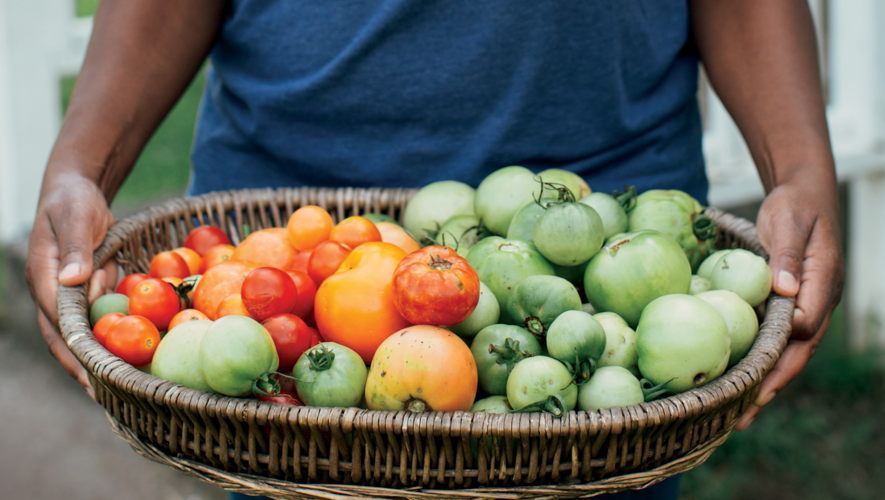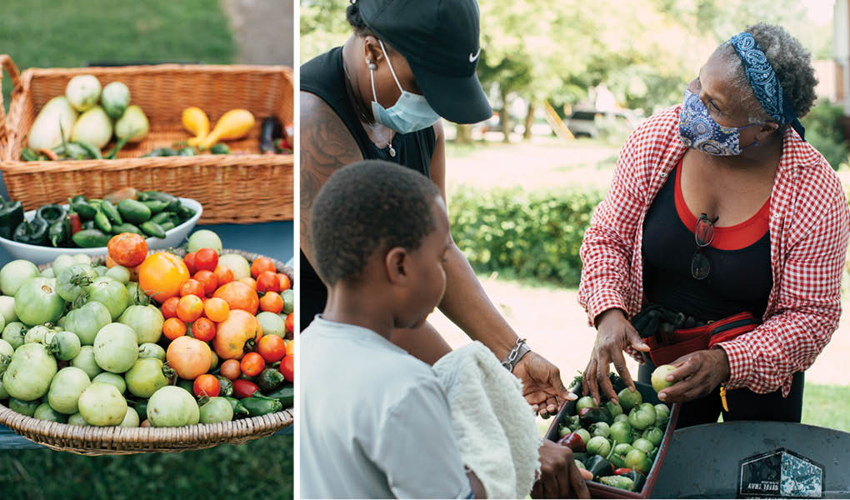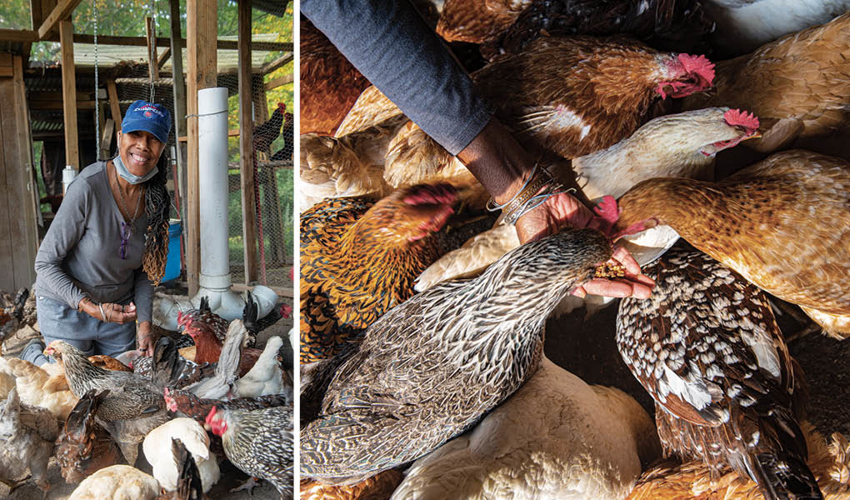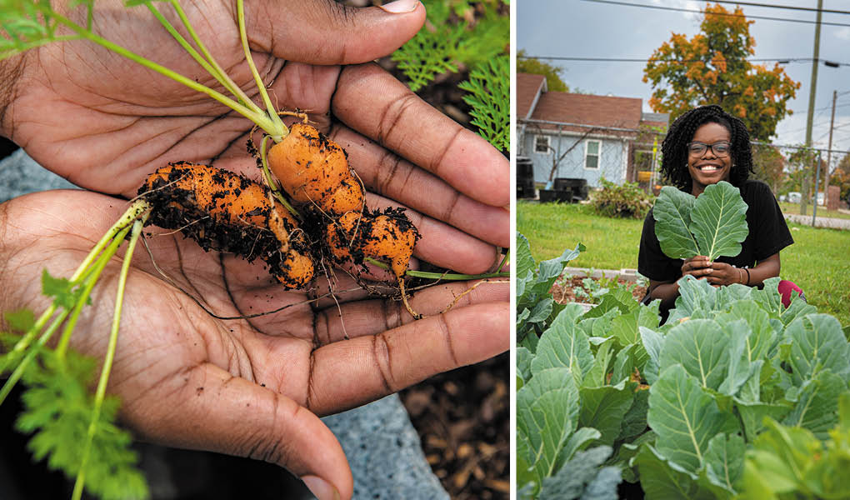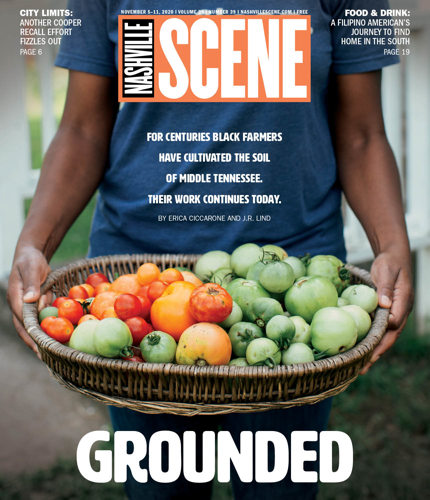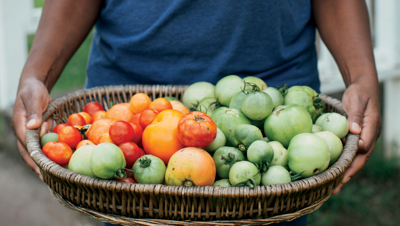
Nella Pearl Frierson (right) harvests vegetables in her garden
Also a part of this week's cover package, see J.R. Lind's piece on the rich history of Black landowners and farmers here in the Upper South.
On the Cellular Level
Something was off about Nella Pearl Frierson’s new neighborhood. It was 1998, and she had just moved her four youngest daughters from J.C. Napier Homes to a house on Haynes Street, just off West Trinity Lane. At Napier, near downtown Nashville, everything happened outside — neighbors chatted on their front stoops; kids rode bicycles and played games; friendships were formed. But in her new neighborhood, Brooklyn Heights, people stayed in their houses.
Frierson was not about to keep her daughters shut up inside. So she encouraged the neighborhood kids to come over and play kickball, jump rope and try to beat her at countless games she devised.
“It just made me feel joyful to interact with the children and have an influence on them,” says Frierson, whom everyone calls “Ms. Pearl.” “I wanted to make sure that they knew me and that my children trusted me. …. And so they would all come, and I was helping them to stay off the streets.”
And the children did trust her. One boy, a Whites Creek High School student and athlete called Bren-Bren, confided in her that a gang was trying to recruit him, and he was running out of options. Bren-Bren was murdered before he graduated high school.
“It made me numb,” says Frierson. “I couldn’t function. I said, ‘God, I got to give them something, some kind of hope, some kind of dream, some kind of — I gotta do something with them. When my blood is running warm in my veins, I got to connect. I got to stop it.’ ”
She prayed and meditated and wrote, seeking a vision of what she could do. Eventually, she started to see the image of a garden that would unite the community and “help heal ourselves on the cellular level.”
Frierson is in her 60s now. She has short gray hair and a gap in her front teeth, and an electric energy about her. Her sentences are constantly punctuated by peals of laughter and squeals of delight. She’s a dancer, and during the course of our hour-long interview, she regularly stands up to stretch and sway. Frierson is an optimist, a perceptive manifester of her own dreams and visions — the kind of person who relies on her intuition as a sixth sense.
“I didn’t know nothing about no garden,” she admits. “My thing was, if you out there pulling weeds and you talking and laughing and giggling, it is highly unlikely you gonna kill me or steal from me if we are part of each other. So that was my premise.”
Frierson was leasing her home to purchase, and in 2008, she bought two vacant lots across the street — and later bought an adjacent lot too. Calling it Brooklyn Heights Community Garden (brooklynheightscommunitygarden.org), Frierson began to coax her neighbors out of their houses to harvest squash, tomatoes and herbs.
In the time since, Frierson has learned about gardening from others in the city, creating a family of farmers and gardeners she can lean on for advice and support. She’s one of many Black food activists who are staking a claim in the future of Middle Tennessee — its soil, its climate and its people.
A decade in, Frierson is ready to expand. In January, she earned her permaculture design certificate from Earth Activist Training in Cazadero, Calif., and she formed the Ironweed Permaculture Collective with other local activists. “We are stewards of earth,” she says. “It doesn’t belong to us. We thinking backwards. If you give the earth what it needs, and you only take what you need, there will always be enough for you and for everybody else.”

Brooklyn Heights Community Garden
Frierson is working in the long tradition of Black Americans using subsistence farming and gardening as a means of self-determination. She recently read Monica M. White’s book Freedom Farmers: Agricultural Resistance and the Black Freedom Movement. She learned about Booker T. Washington and George Washington Carver’s philosophy of agricultural self-sufficiency being not only practical, but necessary for Black Americans to survive the racially hostile post-Reconstruction South. The Tuskegee Institute’s mobile learning center toured the so-called Black Belt — a crescent-shaped region in the American Southeast populated largely by Black people — teaching farmers and sharecroppers about planting cover crops to build up depleted soil, cultivating livestock and managing finances, all in harmony with the land. Carver’s agricultural practices and principles were radical.
In the same book, Frierson read about the Freedom Farm Cooperative that Fannie Lou Hamer formed in the Mississippi Delta in 1969. The FFC offered Black Southerners an alternative to dependence on the white power structure, with which they could achieve self-reliance and solid financial footing by pooling resources and sharing skills.
“I didn’t see the garden as a revolutionary movement,” says Frierson. “But people have shown me books about Black freedom farmers. I never knew that having your own produce, having your own structure, is being in defiance. It’s just my normal, because I’m not fighting against nothing.”
The Brooklyn Heights Community Garden’s strategic plan designates one-third of the garden to be an outdoor classroom where people can come to learn about soil health, planting and harvesting. Frierson also wants to take this education off her land to teach others how to set up plots in their own yards. She’s planning a partnership with Haynes Middle School, American Baptist College and Shallow Church to feed 100 to 200 families next year. And she needs to grow practically too — by way of an irrigation system and a pickup truck. Frierson’s operation has been self-financed, and she’s launching a fundraiser to help manifest her continuing vision of a community where people feel protected and valued.
To Frierson, it’s pretty simple: “Each person got to be the change we speak of, and each person got to take a look at the problem and be the solution within themselves. Nobody’s coming to save us. We it.”

Cynthia Capers, Heniscity
Answering the Call to the Land
Cynthia Capers walks me through the straw-bale garden on her 16-acre Heniscity Farm in Pegram, Tenn. It’s mid-October, and the tomatoes are done for the year, but the okra still produces pale-yellow flowers. She grows cotton, too — just a few plants to remember, she says, what her ancestors went through.
The garden is an experiment Capers is trying. The real attraction is her poultry yard, which she strides through confidently, pointing out guineas, hens, roosters and ducks. She has more than 170 birds on her property and is ready to expand. If you buy a carton of eggs from Heniscity — by going out to the farm or via the online marketplace Hot Poppy — you’ll find a mix of colors and sizes, and Capers includes a card that tells you which breeds produced your breakfast.
“I’d love to be the go-to person for poultry,” says Capers, “so you can buy your hens, you can buy your chicks, you can buy your males if you want to put yourself through that, you can buy your eggs, and you can buy your meat.”
Capers is originally from Chicago, a city that she says is very hard on the Black community. “We’re living there, but we’re not thriving. We’re land people, and it’s too much concrete, and we’re not adapted to it after all these years.”
Land people. That’s something Capers has thought about a lot since she founded Heniscity. For 30 years, she worked, as she says, in every facet of nursing, from home health and trauma to long-term care. But persistent asthma attacks caught up with her, and she retired from nursing in 2017. Capers had been keeping poultry as a hobbyist for 20 years, learning everything she could about poultry health, heritage breeds, eggs and meat. She’s incubated hundreds of eggs in her bathtub. But the prospect of being a full-time poultry farmer was a pipe dream.
“I love the land,” says Capers. “I’ve always been pulled toward the land. … [It has] always called to me, and I’d not been able to answer. I decided I was going to answer it.”

Eggs from Heniscity
She enrolled in TSU’s New Farmer Academy in 2017. The seven-month certificate program teaches everything from soil testing to bidding on a tractor, accessing grant money and much more. During this time, she was making a family tree for her mother when she saw, right there in the census records, that there were farmers in her family line.
“It just overwhelmed me,” Capers says. “I looked in the kitchen, and I felt like they were there. Like they were saying, ‘We wanted to talk to you and meet you, but we didn’t get a chance. Thank you for checking on us and finding us in the family tree.’ ”
Capers learned that her Mississippi ancestors migrated to St. Louis — “an extremely polarized, horrible city for prejudice,” she says. The experience was so painful for her grandmother that Capers’ mom still refuses to talk about it. Running Heniscity has been healing for Capers — to process ancestral trauma and reconnect to a part of herself that she sensed was there all along, but didn’t have the proof to lay claim to. Knowledge of her ancestors has strengthened her resolve to say, “I’m not giving up.”
It isn’t easy. Like Frierson, Capers is in her 60s. The two are friends, and they’ve seen each other through tough moments on their farms. “The finances are crazy as hell,” says Capers. “This was from the ground up for me. I wasn’t handed a farm. I didn’t inherit a farm. I didn’t lease a property that was already a farm. … I feel like there’s a vast amount of things I still don’t know. It’s OK that I don’t know, but there are times I’m like, ‘Oh man, are you kidding me?’ ” In times like these, Capers sometimes receives a text message from Frierson, just saying hello.
“I’m committed to moving forward,” Capers says. And moving forward, Capers plans to raise birds for meat and get more of those bathtub-incubated heritage birds into the yards and farms of others.

Kanita Hutchinson, Trap Garden
Down to the Nitty-Gritty
Kanita Hutchinson’s face shines with pride as she leads me through a community garden on Second Avenue South. She carries herself with the sense of self-possession reserved for people who are certain of their life’s mission. Hers is to feed people.
“We can always easily pinpoint and locate a restaurant,” says Hutchinson, “but how easily can we pinpoint community gardens, or gardens in general?”
Hutchinson is the program director of Trap Garden, a Black-led nonprofit that is working to help Nashvillians access healthy food and oversees the South Nashville Community Garden. Hutchinson’s bachelor’s degree is in agriculture sciences with a concentration in biotechnology, and her master’s degree is in agriculture business management and analysis — both earned at Tennessee State University. Her thesis was about the impact of community gardens in Davidson and Williamson counties. Needless to say, she’s a big advocate.

Trap Garden was founded by another TSU grad named Rob Horton. Hutchinson tells the Scene that Horton, who grew up in St. Louis, was “more likely to see a trap house” — a place where illegal drugs are prepared and sold — “than a grocery store that sold fresh produce.” Trap Garden is rooted in that experience, and it seeks to find solutions to the economic, social and geographic barriers to food security.
The national organization Feeding America maps food insecurity across the country. Its most recent Map the Meal Gap report found that in 2018, Tennessee’s 5th Congressional District had a food insecurity rate of 12.6 percent. For children, it was much higher — 37.2 percent. Several organizations are addressing the city’s food insecurity problem, among them The Nashville Food Project and Second Harvest Food Bank of Middle Tennessee, as well as grassroots projects like the Nashville Free Store.
The South Nashville Community Garden — located on the property of Johnson Alternative Learning Center on Second Avenue South — has tons of potential. Several raised beds are lush with vegetables and herbs — such as collard greens, kale, cabbage and lettuce — and many more await community gardeners to claim them. Through a partnership with The Nashville Food Project and Preston Taylor Ministries, Trap Garden just concluded a nine-week run of distributing 25 boxes of produce to families in need each week, complete with access to videos of cooking demonstrations and information about saving seeds to plant later.
Hutchinson is most animated when she describes the group’s work with third-graders at Buena Vista Elementary Enhanced Option, where she helps lead a small group of kids in learning through food. Hutchinson says that in the school’s garden, kids learn about everything from technology to soil science, engineering and math. By taking these lessons into the community, Trap Garden continues the tradition of Carver and Tuskegee, bringing the classroom where it’s needed to empower Southerners to grow their own food.
When Hutchinson talks about “that Trap Garden experience,” it might sound like slick marketing-speak, but her desires for communion with the land and connection to her food source are real. “When I put my hands in that soil, what do I feel?” she says. “When I don’t have my gloves on, I feel as if I’m getting down to the nitty-gritty. I’m feeling the water from that morning dew. I’m getting a couple of bugs every now and then. But I just appreciate it more.”

Brooklyn Heights Community Garden

